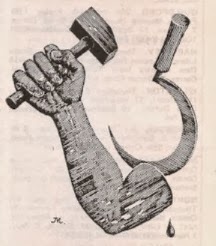The International Communist Current, which has been waiting since its inception for the working class to arm themselves and "smash the state", has recently been troubled by some internal opposition - some members decided that in the absence of the long-awaited "revolutionary war" the next best thing to smash would be the ICC. In a letter to the Socialist Party of Great Britain these ex-ICC members accuse the ICC of being "a bureaucratic sect" which "cannot accept criticisms" and uses "methods worthy of Stalinism". The ex-members have formed a new group which is publishing a duplicated journal called News of War and Revolution. In it they make two criticisms of the ICC: firstly, that "it contained a permanent elite to run the organisation and take its decisions", and secondly, that most of its predictions about "events in the real world" have been proved wrong.
It is rather odd that the ICC's "permanent elite" and undemocratic structure should be a surprise to these ex-members. After all, the ICC is an avowedly Leninist organisation which claims to admire and base itself upon the Bolshevik party. Bolshevism made no claim to be a respecter of majority decisions, but is based on the principle of rule by the vanguard. Some time ago the writer was at an ICC meeting and suggested to the speaker that the only way to achieve real socialist democracy is by democratic political organisation. The speaker's reply was that the ICC is a Leninist organisation aiming for "proletarian dictatorship" and is not interested in the niceties of democracy. Those who show contempt for the democratic process - for whatever reason - will before long degenerate into the kind of "Stalinist methods" of which the ICC is now accused. The link between Leninism and Stalinism is not an accidental one. But despite the cries of indignation from those who have left the ICC, they are no more interested in real democracy that the ICC is. It is particularly pitiful that the ICC's romantic illusions about bombs and barricades have led to the traditional allegations about certain members being police agents. (This matter is dealt with in an article in News of War and Revolution entitled "ICC Uses State Terror".)
The second criticism by the ex-ICCers is that the ICC's predictions about society are wrong. Basically, the ICC believes that since 1914 capitalism has been collapsing, and that this collapse will soon lead either to world war or armed revolution. Repeating Leninist cliches about the imminent collapse of capitalism and the need to arm the proletariat, the ICC has completely failed to understand that the old insurrectionary tactics of France in 1789 and Russia in 1917 (which were capitalist revolutions) are not applicable in 1982. The pathetic fact about the ICC - and their counterparts in the other Leninist sects - is that they are preparing to fight a violent capitalist revolution which happened long ago. Those who have been wise enough to leave the ICC would do well to learn that Leninism is completely opposed to the present-day interest of the working class. But from their literature, we suspect that the ICC breakaway group are rather slow learners.
Blind Ali
Meanwhile, another Leninist sect - the International Marxist Group - is undergoing a rather traumatic experience: its shepherd has abandoned the flock and is trying to join the Labour Party. In the May 1981 Socialist Standard we reported a debate at the Central Hall, Westminster, in which Benn and Company put the case for the Labour Party and Leninist chiefs, Paul Foot and Tariq Ali put the case against. It is worth quoting the concluding words of Tariq Ali's speech in the debate:
. . . we are opposed to Labourism, that weak, sickly and pathetic political ideology which has dominated the British working class. It must be displaced if we are to move forward.(The Crisis and the Future of the Left, p.74, Pluto Press.)
No sooner had the masses stopped applauding Tariq's rhetoric than he had filled out an application form to join the Labour Party. Explaining his decision to resign from the IMG and join Labour in an article in City Limits (27/11/81), Ali states: "I have joined the Labour Party without renouncing my political views". Now, what are his innocent followers in the IMG to make of that? At one moment they are told to oppose "the weak, sickly and pathetic ideology" of the Labour Party and then are informed that their leader has joined the Labour Party but still holds the same views. By the same logic, Tariq might tell his followers to oppose the Tories, but then to join the Tory Party in order to demonstrate such opposition. Not all members of the IMG are convinced by their ex-leader's "tactics" and rumour has it that some of them will be proving the truth of the old saying that one Leninist is "a militant", two "a faction" and three "a schism".
Steve Coleman


